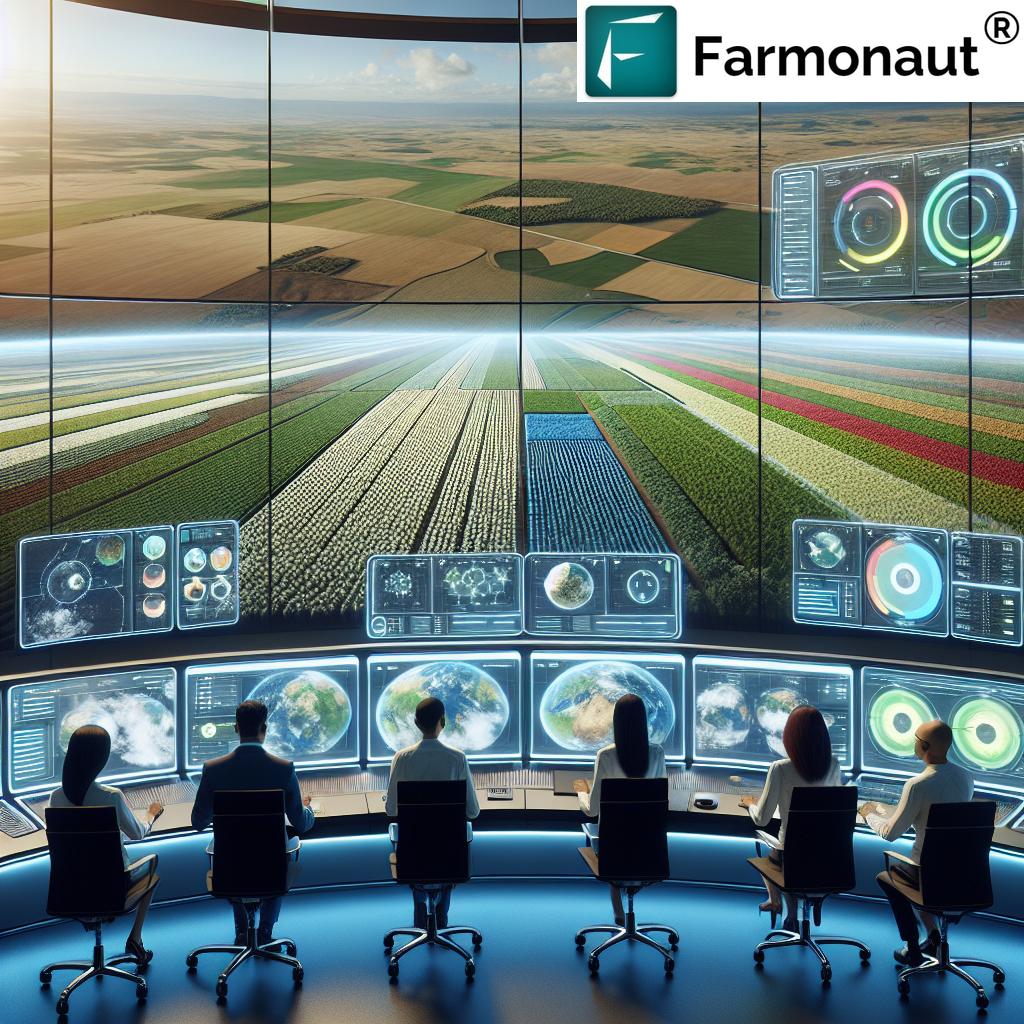Revolutionizing Agriculture: How Farmonaut’s Precision Farming Technology Optimizes Crop Yields Through Satellite Imagery

“Farmonaut’s satellite imagery technology can analyze up to 10,000 acres of farmland per day, enhancing precision farming efficiency.”
In the ever-evolving landscape of modern agriculture, we are witnessing a remarkable transformation driven by cutting-edge agricultural technology. At the forefront of this revolution is Farmonaut, a pioneering company that is reshaping the way we approach farming through innovative precision farming techniques and advanced crop monitoring systems. By harnessing the power of satellite imagery in agriculture, Farmonaut is not just changing the game – it’s redefining it.
In this comprehensive exploration, we’ll delve into how Farmonaut’s state-of-the-art technology is optimizing crop yields, promoting sustainable agriculture, and empowering farmers with data-driven insights that were once the stuff of science fiction. From the intricacies of remote sensing for crops to the practical applications of farm management software, we’re about to embark on a journey through the fields of tomorrow.
The Dawn of Precision Farming: Farmonaut’s Technological Edge
Precision farming represents a paradigm shift in agricultural practices, and Farmonaut stands at the vanguard of this movement. By integrating satellite imagery, artificial intelligence, and sophisticated data analysis, Farmonaut offers a suite of smart farming solutions that are both powerful and accessible.
- Satellite-Based Crop Health Monitoring: Farmonaut utilizes multispectral satellite images to provide real-time insights into crop health, soil moisture levels, and other critical agricultural data.
- AI-Driven Advisory Systems: The Jeevn AI system delivers personalized recommendations and forecasts, enabling farmers to make informed decisions about their crops.
- Blockchain for Traceability: Implementing blockchain technology ensures transparency and security in agricultural supply chains.
- Advanced Resource Management: Tools for efficient fleet and resource management help reduce operational costs and improve overall farm productivity.
These technological advancements are not just incremental improvements; they represent a quantum leap in how we approach farming in the 21st century.
The Power of Satellite Imagery in Modern Agriculture
At the heart of Farmonaut’s innovation is the strategic use of satellite imagery in agriculture. This technology allows for unprecedented levels of crop monitoring and analysis, providing farmers with a bird’s-eye view of their fields that was previously unimaginable.
- Vegetation Health Indices: Normalized Difference Vegetation Index (NDVI) and other metrics offer insights into crop vigor and stress levels.
- Soil Moisture Analysis: Satellite data helps in assessing soil moisture content, crucial for irrigation planning.
- Pest and Disease Detection: Early identification of potential threats through spectral analysis of crop canopies.
- Yield Prediction: Advanced algorithms use historical and real-time data to forecast crop yields with increasing accuracy.
By leveraging these capabilities, Farmonaut empowers farmers to make data-driven decisions that optimize resource use and maximize crop yields.
Transforming Agricultural Data Analysis
The sheer volume of data generated by satellite imagery and on-ground sensors would be overwhelming without sophisticated analysis tools. Farmonaut’s platform excels in turning this raw data into actionable insights through advanced agricultural data analysis techniques.
- Machine Learning Algorithms: These tools process vast amounts of data to identify patterns and trends invisible to the human eye.
- Predictive Analytics: By analyzing historical data and current conditions, Farmonaut can predict future crop performance and potential issues.
- Custom Reporting: Tailored reports provide farmers with clear, concise information relevant to their specific needs and crops.
This level of analysis transforms raw data into a powerful decision-making tool, allowing farmers to optimize every aspect of their operations.
Remote Sensing: The Eyes in the Sky for Modern Farmers
Remote sensing for crops has revolutionized the way we monitor and manage agricultural land. Farmonaut’s use of this technology provides several key advantages:
- Non-Invasive Monitoring: Gather crucial data without disturbing crops or soil.
- Large-Scale Coverage: Monitor vast areas of farmland efficiently and cost-effectively.
- Frequent Updates: Regular satellite passes provide up-to-date information throughout the growing season.
- Multispectral Analysis: Capture data across various light spectrums to reveal different aspects of crop and soil health.
This technology allows farmers to detect issues early, respond quickly to changing conditions, and make informed decisions about crop management.
Yield Optimization: The Ultimate Goal
At its core, Farmonaut’s mission is to help farmers achieve optimal crop yields while promoting sustainable practices. The platform’s yield optimization strategies include:
- Precision Resource Application: Apply water, fertilizers, and pesticides only where and when needed.
- Crop-Specific Insights: Tailored advice based on the unique needs of different crop types and varieties.
- Weather Integration: Incorporate local weather data to fine-tune farming practices.
- Historical Performance Analysis: Learn from past seasons to continually improve farming strategies.
“Precision farming techniques using satellite data can increase crop yields by up to 20% while reducing water usage by 30%.”
By focusing on these areas, Farmonaut helps farmers not just increase their yields, but do so in a way that’s sustainable and economically viable.
The Role of Farm Management Software in Modern Agriculture
Farmonaut’s farm management software is the command center for modern agricultural operations. This comprehensive platform integrates various aspects of farm management into a single, user-friendly interface.
- Crop Planning: Tools for designing optimal crop rotations and planting schedules.
- Resource Tracking: Monitor and manage inputs like seeds, fertilizers, and water usage.
- Financial Management: Track expenses and revenues to maintain a clear picture of farm finances.
- Compliance and Reporting: Simplify record-keeping for regulatory compliance and certification purposes.
This integrated approach to farm management allows for greater efficiency and profitability across all aspects of agricultural operations.
Explore Farmonaut’s API for advanced integration
Sustainable Agriculture: A Core Focus
Sustainability is not just a buzzword for Farmonaut; it’s a fundamental principle guiding their technology development. By promoting sustainable agriculture practices, Farmonaut helps farmers reduce their environmental impact while maintaining productivity.
- Reduced Chemical Usage: Precision application minimizes the need for pesticides and fertilizers.
- Water Conservation: Smart irrigation systems based on real-time soil moisture data.
- Soil Health Monitoring: Track soil quality over time to maintain long-term fertility.
- Carbon Footprint Reduction: Optimize operations to minimize greenhouse gas emissions.
These sustainable practices not only benefit the environment but also contribute to long-term farm viability and profitability.
Smart Farming Solutions: Accessibility and Implementation
One of Farmonaut’s key strengths is making advanced agricultural technology accessible to farms of all sizes. Their smart farming solutions are designed with user-friendliness and scalability in mind.
- Mobile Applications: Access farm data and insights on-the-go through smartphone apps.
- Cloud-Based Platform: No need for expensive on-site hardware; all data is securely stored and accessed via the cloud.
- Scalable Solutions: Services that can grow with your farm, from small holdings to large agricultural enterprises.
- Training and Support: Comprehensive resources to help farmers make the most of the technology.
These features ensure that farmers can easily adopt and benefit from Farmonaut’s technology, regardless of their technical expertise or farm size.
The Future of Farming: AI and Machine Learning
As we look to the future, artificial intelligence and machine learning will play an increasingly crucial role in agriculture. Farmonaut is at the forefront of integrating these technologies into their platform.
- Automated Crop Classification: AI algorithms that can identify crop types and growth stages from satellite imagery.
- Predictive Maintenance: Machine learning models that forecast equipment maintenance needs, reducing downtime.
- Adaptive Recommendations: AI systems that learn from historical data to provide increasingly accurate and personalized advice.
- Autonomous Decision-Making: Future systems may be capable of making real-time adjustments to farm operations without human intervention.
These advancements promise to further revolutionize farming, making it more efficient, productive, and sustainable than ever before.
Comparative Analysis: Traditional vs. Precision Farming
To truly appreciate the impact of Farmonaut’s technology, let’s compare traditional farming methods with precision farming techniques:
| Aspect | Traditional Farming | Precision Farming with Farmonaut |
|---|---|---|
| Crop Monitoring Frequency | Periodic, manual inspections | Continuous, real-time satellite monitoring |
| Data Analysis Method | Manual observation and experience-based decisions | AI-powered data analysis and insights |
| Decision-Making Process | Intuition and historical practices | Data-driven, scientifically backed decisions |
| Resource Optimization | Generalized application across fields | Precise, need-based application |
| Yield Improvement (estimated %) | Baseline | Up to 20% increase |
| Sustainability Impact | Variable, often resource-intensive | Reduced environmental impact, more sustainable practices |
| Cost-Effectiveness (estimated) | Baseline | 15-30% reduction in input costs |
This comparison clearly illustrates the significant advantages that Farmonaut’s precision farming technology offers over traditional methods.
Addressing Challenges in Modern Agriculture
While the benefits of precision farming are clear, it’s important to address the challenges that farmers may face in adopting these technologies. Farmonaut has developed strategies to overcome common hurdles:
- Technology Adoption: User-friendly interfaces and comprehensive training programs to ease the transition.
- Data Privacy: Robust security measures to protect sensitive farm data.
- Initial Investment: Flexible pricing models to make the technology accessible to farms of all sizes.
- Internet Connectivity: Offline capabilities for areas with limited internet access.
By addressing these challenges head-on, Farmonaut ensures that the benefits of their technology are accessible to a wide range of agricultural operations.
The Economic Impact of Precision Farming
The adoption of Farmonaut’s precision farming technology can have a significant economic impact on agricultural operations:
- Increased Profitability: Higher yields and reduced input costs lead to improved profit margins.
- Risk Mitigation: Early detection of crop issues reduces the risk of large-scale crop failures.
- Market Competitiveness: Improved quality and consistency of crops can command better prices in the market.
- Long-term Sustainability: Sustainable practices ensure the long-term viability of farming operations.
These economic benefits make precision farming not just a technological advancement, but a sound business decision for modern farmers.
Farmonaut’s Global Impact
While Farmonaut’s technology has its roots in addressing local agricultural challenges, its impact is increasingly global. The platform’s ability to adapt to different crops, climates, and farming practices makes it a valuable tool for farmers worldwide.
- Cross-Continental Application: From the rice paddies of Asia to the wheat fields of North America, Farmonaut’s technology is versatile and adaptable.
- Addressing Global Food Security: By optimizing crop yields, Farmonaut contributes to the global effort to ensure food security for a growing population.
- Climate Change Adaptation: The platform’s real-time monitoring and predictive capabilities help farmers adapt to changing climate patterns.
- Knowledge Sharing: Farmonaut facilitates the exchange of best practices across different agricultural regions.
This global perspective underscores the transformative potential of Farmonaut’s technology in shaping the future of agriculture worldwide.
The Role of Data in Modern Agriculture
Data is the lifeblood of precision farming, and Farmonaut’s platform is designed to make the most of this valuable resource. Here’s how data is revolutionizing agriculture:
- Historical Analysis: Years of accumulated data provide insights into long-term trends and patterns.
- Real-Time Decision Making: Up-to-the-minute data allows for rapid responses to changing conditions.
- Predictive Modeling: Advanced algorithms use current and historical data to forecast future scenarios.
- Benchmarking: Farmers can compare their performance against industry standards and peer groups.
By harnessing the power of data, Farmonaut empowers farmers to make informed decisions that can significantly impact their bottom line.
The Environmental Benefits of Precision Farming
Beyond the economic advantages, Farmonaut’s technology offers significant environmental benefits:
- Reduced Chemical Runoff: Precise application of fertilizers and pesticides minimizes environmental contamination.
- Water Conservation: Smart irrigation systems significantly reduce water waste.
- Soil Health Preservation: Optimal resource management helps maintain long-term soil fertility.
- Biodiversity Protection: Reduced chemical use and better land management practices support local ecosystems.
These environmental benefits align with global sustainability goals and help ensure the long-term viability of agricultural lands.
The Future of Farmonaut and Precision Agriculture
As we look to the future, Farmonaut continues to innovate and expand its capabilities. Some exciting developments on the horizon include:
- Integration with IoT Devices: Connecting with on-ground sensors for even more precise data collection.
- Advanced AI Capabilities: More sophisticated AI models for improved prediction and decision-making.
- Expanded Crop Coverage: Continuous addition of new crop types and varieties to the platform.
- Enhanced Mobile Capabilities: Improved mobile apps for even greater accessibility and ease of use.
These advancements will further cement Farmonaut’s position as a leader in agricultural technology and precision farming.
Conclusion: Embracing the Agricultural Revolution
As we’ve explored throughout this article, Farmonaut’s precision farming technology is at the forefront of a revolution in agriculture. By harnessing the power of satellite imagery, artificial intelligence, and advanced data analysis, Farmonaut is empowering farmers to optimize their crop yields, reduce their environmental impact, and navigate the challenges of modern agriculture.
From small family farms to large agricultural enterprises, the benefits of this technology are clear: increased productivity, improved sustainability, and enhanced profitability. As we face the global challenges of food security and climate change, innovations like those offered by Farmonaut will play a crucial role in shaping the future of farming.
The agricultural revolution is here, and with tools like Farmonaut at our disposal, we’re better equipped than ever to meet the demands of feeding a growing world while preserving our planet for future generations.

Farmonaut Subscriptions
Frequently Asked Questions
Q: What is precision farming?
A: Precision farming is an agricultural management concept that uses technology to observe, measure, and respond to variability in crops. It involves using satellite imagery, sensors, and data analysis to optimize farming practices.
Q: How does Farmonaut’s technology improve crop yields?
A: Farmonaut uses satellite imagery and AI to provide real-time insights into crop health, soil moisture, and other factors. This allows farmers to make data-driven decisions about irrigation, fertilization, and pest control, leading to optimized crop yields.
Q: Is Farmonaut’s technology suitable for small farms?
A: Yes, Farmonaut’s solutions are scalable and designed to be accessible for farms of all sizes, from small family farms to large agricultural enterprises.
Q: How does Farmonaut contribute to sustainable agriculture?
A: By enabling precise resource management, Farmonaut helps reduce water usage, minimize chemical applications, and preserve soil health, all of which contribute to more sustainable farming practices.
Q: What types of crops can benefit from Farmonaut’s technology?
A: Farmonaut’s technology is versatile and can be applied to a wide range of crops, including grains, fruits, vegetables, and cash crops.
Q: How often is satellite data updated on the Farmonaut platform?
A: The frequency of satellite data updates can vary, but Farmonaut typically provides regular updates throughout the growing season, allowing for timely decision-making.
Q: Does Farmonaut offer training for farmers new to precision agriculture?
A: Yes, Farmonaut provides comprehensive training and support to help farmers effectively utilize their technology and interpret the data provided.
Q: How does Farmonaut ensure data privacy and security?
A: Farmonaut implements robust security measures to protect farm data, ensuring that sensitive information remains confidential and secure.
Q: Can Farmonaut’s technology help with climate change adaptation?
A: Yes, by providing real-time data and predictive insights, Farmonaut helps farmers adapt to changing climate patterns and weather conditions.
Q: Is an internet connection required to use Farmonaut’s services?
A: While an internet connection enhances the real-time capabilities of the platform, Farmonaut also offers offline functionalities for areas with limited connectivity.






